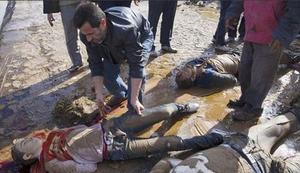TerrorismMilitant Islamism in Russia is the product of outside influences
Muslims in Russia, who belong to Turkic ethnic groups (this includes the largest Muslim group in Russia, the Tatars), practice moderate Sunni Islam of the Hanafite school. Russian Muslims living in the Caucasus Mountains practice Sunni Islam of the Shafiite school. A large number of Russian Muslims also follow Sufi orders — Naqshbandi, Qadiri, and others. The radicalization of some Russian Muslims began in the early 1990s with Saudi-financed madrassas where radical and fundamentalist strands of Islam were taught, and where Islamist militants were trained, and with Saudi-financed radical preachers spreading “true Islam.” The madrassas were closed in 2000, and the fundamentalist preachers ordered out of the country, but by then enough Russian Muslims were already radicalized.

One result of Russian Islamic militants // Source: alalam.ir
Last September, Russian president Vladimir Putin warned leaders of the Collective Security Treaty Organization (CSTO) that Islamist militants fighting Syrian president Bashar al-Assad could soon expand their attacks beyond Syria and the Middle East. “The problem of terrorism spilling from one country to another is absolutely real and could directly affect the interests of any one of our countries,” Putin said, citing the deadly attack on the Westgate shopping mall in Nairobi as an example.
The CSTO consists of Belarus, Armenia, Tajikistan, Kazakhstan, Kyrgyzstan, and Russia, all ofwhich have large Muslim populations.
Through arms shipments to the Syrian military and blocking Western-backed initiatives in the UN Security Council, Russia has been a strong supporter of Assad in the Syrian conflict which began in March 2011. Putin believes that allowing Islamist militants to succeed in Syria would energize the Islamist militant population in Russia.
According to Al-Monitor, Russia’s problems with Islamist extremism began with the role of Arab missionaries spreading radical Islam among Russian Muslims through educational institutions. Muslims in Russia, who belong to Turkic ethnic groups (this includes the largest Muslim group in Russia, the Tatars) practice Sunni Islam of the Hanafite school. Russian Muslims living in the Caucasus Mountains practice Sunni Islam of the Shafiite school. A large number of Russian Muslims also follow Sufi orders — Naqshbandi, Qadiri, and others.
At the beginning of the Islamic revival in Russia in the early 1990s, Arab missionaries operating as preachers and teachers influenced Russian Muslims with what they called “pure Islam.” According to the memoirs of Ildus Fayzov, the former mufti of Tatarstan, local Muslims looked at the Arab missionaries “almost as if they were looking at the Prophet himself.”
The Saudi charitable organization Taibah agreed to provide educational assistance to the Yoldyz madrassa in Naberezhnye Chelny, the second largest city in Tatarstan. Soon, the educational programs began advocating radical strands of Islam and training radicals, some of whom fought in the Chechen war as part of jihadist militant groups. Many Russian students at the Saudi-backed madrassas were even sent to study at religious educational institutions in Saudi Arabia and Kuwait.
Recognizing the threat the Arab missionaries posed to the stability of moderate Islam in Russia, the Taibah organization was soon banned in Russia, followed by the closing in 2000 of the Taibah-supported madrassas on the grounds that their activities were contrary to the values of the local Islamic Hanafite and Sufi traditions.
Today Russian authorities are concerned with the growing number of Russians converting to Islam; of which a significant number have joined radical Islamist groups. Some members of these groups have carried out bombings and suicide attacks in Russia, most recently the October and December 2013 terror acts in Volgograd.
To add to the concerns of Russian authorities, local Muslims are being recruited to fight on behalf of extremists groups in Afghanistan, Pakistan, and now Syria. Al-Monitor reports that the ranks of terrorist organization Islamic State of Iraq and al-Sham (ISIS) and other jihadist groups include hundreds of Russians (about 250 from Chechnya).
The Russian authorities are concerned that in the aftermath of the Syrian civil war, Russian fighters, specifically Chechen Islamist militants, will return to Russia and influence local Muslim populations; in a manner similar to what the Arab missionaries did in Russia in the 1990s. These concerns are among the reasons for Russia’s policy on the Syrian crisis and its efforts to prevent the arming of various rebel groups attempting to overthrow Assad.
